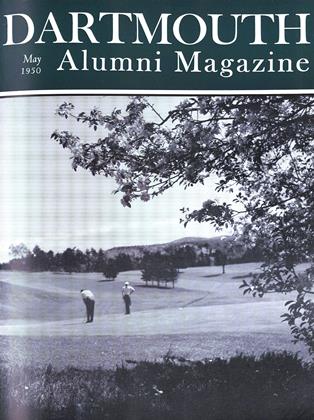THE MOST INFORMATIVE BOOK in English on Arabia since C. M. Doughty's masterpiece, Arabia Deserta (1888), is unquestionably H. R. P. Dickson's TheArab of the Desert, first published in 1949 by George Allen 8c Unwin Ltd. of London at 63 shillings. It is a book of 648 pages and covers such diverse topics as "The Tent and its Furnishings," the "Badawin Social System," discussions of Arab honor, marriage and divorce, women's "secrets," children, faith and prayer, food and hospitality, smoking, sandstorms, crime, the supernatural, and many other topics equally interesting. The book is, in fact, an encyclopaedia about Arabia and no American contemplating business with the Arabs, or travel in Arabia, should be without this book. There are illustrations, maps, appendices, a glossary, and a fine index. If it is becoming a disgrace to know something about your subject, then Mr. Dickson must bow his head, for he has lived on and off in Arabia almost since his birth there in 1881, and takes rank with St. John Philby, Bertram Thomas, and Freya Stark, as an authority on this oilsoaked land, one of the danger spots in international politics today. If you want to be informed about the people and the country this book is indispensable.
Reginald L. Hine, about whom I wrote last month, was described to me recently in a letter from an English friend as an "anxious" sort of man. In my opinion his suicide was a tragic loss to letters. Those who like him will enjoy, I feel sure, his last book, Charles Lamb if HisHertfordshire (Dent, 1949). In a book of 374 pages Mr. Hine reveals himself as a lover of Elia second to none, and as an authority on the country which contains such charming places as Hemel Hempsted, Gpffs Oak, Bishop Stortford, Cherry Green, Button Snap, Ickleford, Hitchen, Little Amwell, and Panshanger. I, alas, cannot afford a trip to England, a country I love second only to my own, and for the time being, this book must be one of my substitutes for the real thing. It is as good a substitute as a book could be.
For all who are interested in writing, editing, and publishing, Editor to Author, the letters of Maxwell E. Perkins, edited by John Hall Wheelock, and published by Scribner's recently, will prove entertaining, stimulating, and even most helpful. This, because Perkins was the greatest book editor of his time, modest ("Don't ever defer to my judgment"), shrewd and tactful (see letters on pages 54-55, and 58 ff.), generous and unsparing of himself, and possessing what Pascal called espritde finesse, a quality of mind almost necessary in a reader and editor. The late Edward Garnett also possessed this to an unusual degree. The text is excellent; sometimes, in fact altogether too often, the footnotes are just plain silly. Mr. Wheelock certainly lapsed in judgment here, but his choice of letters is excellent.
On April 13 Charles Jackson's new book The Sunnier Side, a book of twelve short stories about Arcadia (where almost all o£ us grew up) appeared. As long as three years ago when I was sojourning in Dick's House, I read with great admiration, "Rachel's Summer" and "Palm Sunday," two stories which established Mr. Jackson years ago as an exceedingly fine writer. He can draw the most evocative pictures of small town life which are bound to arouse in the reader distant but none the less almost clairvoyant memories. This is certainly the best book of the writer's since The Lost Weekend and deserves the success it is sure to have.
A book which I ordered when I first heard of it is now in my hands and I recommend it to anyone interested in (1) autobiography or (2) science. This is AnAutobiography written by Sir Arthur Keith and published by Watts 8c Co., London, this year. I gather that Sir Arthur is not a very social man, is devoted to a study of primitive man and his evolution, and that he came up the hard way. He was born in February 1866, the son of a Scots father and mother, who ran a farm; and he wrote this book while living, since February 1947, in the small Kentish parish of Downe, sacred to the memory of the great Charles Darwin. It is a long book of over 700 pages but one I find peculiarly satisfying.
If you enjoy unpretentious historical novels you will enjoy, I think, Noel Gerson's Savage Gentleman (Doubleday) about the French and Indians versus the British colonists in the New York frontier from 1705 on.
 View Full Issue
View Full Issue
More From This Issue
-
 Article
ArticleWDBS
May 1950 By DICK T. HOLLANDS '50 -
 Class Notes
Class Notes1917
May 1950 By KARL W. KOENICER, DONALD BROOKS, HOWARD A. STOCKWELL -
 Class Notes
Class Notes1918
May 1950 By ERNEST H. EARLEY, DONALD L. BARR, RICHARD A. HOLTON -
 Class Notes
Class Notes1923
May 1950 By TRUMAN T. METZEL, COLIN C. STEWART 3RD, LEON H. YOUNG JR. -
 Class Notes
Class Notes1905
May 1950 By ROYAL PARKINSON, GILBERT H. FALL, FLETCHER A. HATCH -
 Class Notes
Class Notes1929
May 1950 By F. WILLIAM ANDRES, EDWIN C. CHINLUND, GEORGE B. REDDING
HERBERT F. WEST '22
-
 Article
ArticleHANOVER BROWSING
April1935 By Herbert F. West '22 -
 Article
ArticleA Dartmouth Bookshelf
June 1946 By HERBERT F. WEST '22 -
 Article
ArticleHanover Browsing
December 1946 By HERBERT F. WEST '22 -
 Article
ArticleHanover Browsing
May 1947 By HERBERT F. WEST '22 -
 Article
ArticleHanover Browsing
April 1954 By HERBERT F. WEST '22 -
 Article
ArticleHanover Browsing
March 1957 By HERBERT F. WEST '22
Article
-
 Article
ArticleFACULTY MEMBERS REPRESENT 120 EDUCATIONAL INSTITUTIONS
December, 1922 -
 Article
ArticleUrban Design Course
March 1962 -
 Article
ArticleSports Roundup
July/Aug 2009 -
 Article
ArticleA True Dog Story
December 1953 By A. I. Dickerson -
 Article
ArticleCarnival Movie
March 1939 By Davis Jackson '36. -
 Article
ArticleThayer School
OCTOBER 1967 By RUSS STEARNS '38


